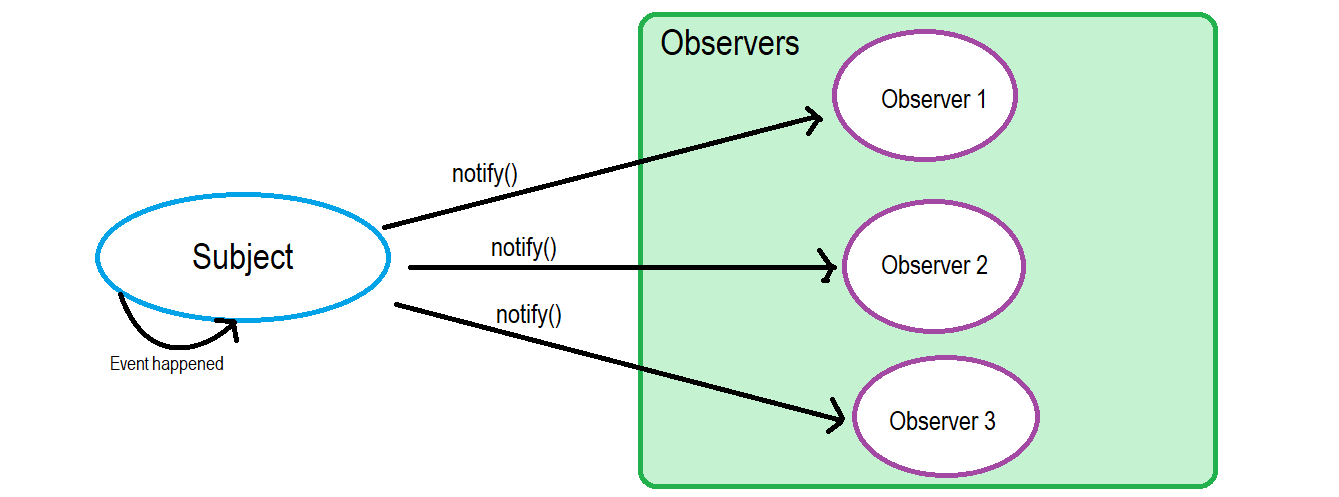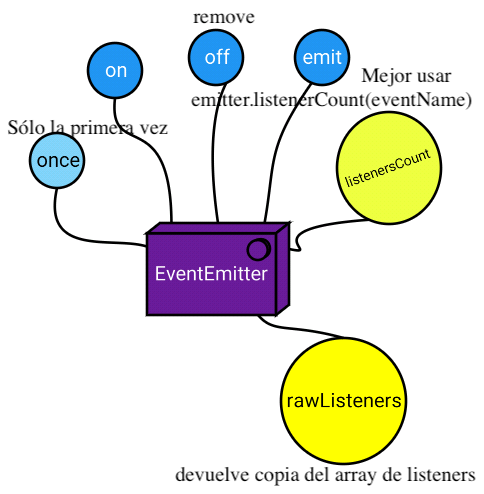# Node.js EventEmitters
EventEmitter (opens new window) is a very important class in Node.js. It provides a channel for events to be dispatched and listeners to be notified. Many objects you’ll encounter in Node.js inherit from EventEmitter, like the Streams class.
# The Observer Pattern
The concept behind EventEmitter is quite simple:
emitter objects emit named events that cause previously registered listeners to be called. So, an emitter object basically has two main features:
- Emitting name events.
- Registering and unregistering listener functions.
It’s kind of like a pub/sub or observer design pattern (though not exactly).
The Observer Pattern
The observer pattern is a software design pattern in which an object, called the subject, maintains a list of its dependents, called observers, and notifies them automatically of any state changes, usually by calling one of their methods.

See also
- Learning JavaScript Design Patterns. A book by Addy Osmani (opens new window) and the chapter The Observer Pattern (opens new window)
# La Clase EventEmitter
- Algunos métodos de los objetos de la clase EventEmitter (opens new window):

# on
The on (opens new window) method is used to register listeners:
[~/.../p4-t2-networking/networking-with-sockets-chapter-3-crguezl(master)]$ node
Welcome to Node.js v12.10.0.
Type ".help" for more information.
> const {EventEmitter} = require("events")
undefined
> function c1() { console.log('an event occurred!');}
undefined
> function c2() { console.log('yet another event occurred!');}
undefined
> const myEmitter = new EventEmitter();
undefined
> myEmitter.on('eventOne', c1);
EventEmitter {
_events: [Object: null prototype] { eventOne: [Function: c1] },
_eventsCount: 1,
_maxListeners: undefined
}
> myEmitter.on('eventOne', c2)
EventEmitter {
_events: [Object: null prototype] {
eventOne: [ [Function: c1], [Function: c2] ]
},
_eventsCount: 1,
_maxListeners: undefined
}
2
3
4
5
6
7
8
9
10
11
12
13
14
15
16
17
18
19
20
21
22
23
24
25
When you emit the event, all the listeners are called:
> myEmitter.emit('eventOne');
an event occurred!
yet another event occurred!
true
2
3
4
# once
emitter.once(eventName, listener) (opens new window) adds a one-time listener function for the event named eventName. The next time eventName is triggered, this listener is removed and then invoked.
> myEmitter.once('eventOnce', () => console.log('eventOnce once fired'));
EventEmitter {
_events: [Object: null prototype] {
eventOne: [ [Function: c1], [Function: c2] ],
eventOnce: [Function: bound onceWrapper] { listener: [Function] }
},
_eventsCount: 2,
_maxListeners: undefined
}
2
3
4
5
6
7
8
9
Since the once method was called, the listener is called only once:
> myEmitter.emit('eventOnce');
eventOnce once fired
true
> myEmitter.emit('eventOnce');
false
> myEmitter.emit('eventOnce');
false
2
3
4
5
6
7
# Argumentos
You can pass arguments to the listeners of your event:
> myEmitter.on('status', (code, msg)=> console.log(`Got ${code} and ${msg}`));
EventEmitter {
_events: [Object: null prototype] {
eventOne: [ [Function: c1], [Function: c2] ],
status: [Function]
},
_eventsCount: 2,
_maxListeners: undefined
}
2
3
4
5
6
7
8
9
Now you can emit the event with arguments:
> myEmitter.emit('status', 200, 'ok');
Got 200 and ok
2
# off
off is an alias for emitter.removeListener(eventName, listener) (opens new window).
It removes a listener from the listeners array for the specified event:
> myEmitter.off('eventOne', c1);
EventEmitter {
_events: [Object: null prototype] {
eventOne: [Function: c2],
status: [Function]
},
_eventsCount: 2,
_maxListeners: undefined
}
2
3
4
5
6
7
8
9
Since we removed the listener c1, it won’t be called when we emit the event:
> myEmitter.emit('eventOne');
yet another event occurred!
true
2
3
# listenerCount and rawListeners
The method listenerCount returns the number of listeners for a given event:
> myEmitter.listenerCount('eventOne')
1
2
The method rawListeners returns an array of listeners for a given event:
> myEmitter.rawListeners('eventOne')
[ [Function: c2] ]
2
# Ejercicio
Vamos ahora a escribir una clase WithTime cuyos objetos disponen de un método execute que permite ejecutar
una función asíncrona asyncfun que acepta como último argumento una callback cb.
Como es habitual, se supone que la callback es llamada cb(err, data) por asyncfun cuando esta termina su tarea asíncrona.
El primer parámetro err indica el error si lo hubo y el segundo data con el resultado de la operación asíncrona: cb(err, data).
Se pide que:
- La función
executeemita eventosbeginyendseñalando el comienzo y final de la ejecución deasyncfun - Deberá así mismo emitir un evento
resultcon el resultado de la operación asíncrona. - Deberá emitir un evento
timeindicando el tiempo que ha tomado la ejecución en nanosegundos (useprocess.hrtime.bigint(opens new window) para ello)
Por ejemplo, un código como:
const inspect = require("util").inspect;
const ins = (x) => inspect(x, {depth: Infinity, colors: true});
const fetch = require("node-fetch");
const WithTime = require("./with-time.js");
const withTime = new WithTime();
withTime.on('begin', (label) => console.log('About to execute '+label));
withTime.on('end', (label) => console.log('Done with execution of '+label));
withTime.on('result', (label, data) => console.log('Function '+label+' produced:\n'+ins(data)));
withTime.on('time', (label, t) => console.log('Function '+label+' took '+t+' nanoseconds'));
const readFile = (url, cb) => {
fetch(url)
.then((resp) => resp.json())
.then(function(data) {
cb(null, data);
})
.catch(e => console.log(`Buf!\n${e}`));
}
withTime.execute(readFile, 'https://jsonplaceholder.typicode.com/posts/3');
2
3
4
5
6
7
8
9
10
11
12
13
14
15
16
17
18
19
20
21
22
23
24
25
Debería producir una salida como está:
About to execute readFile
Function readFile produced:
{
userId: 1,
id: 3,
title: 'ea molestias quasi exercitationem repellat qui ipsa sit aut',
body: 'et iusto sed quo iure\n' +
'voluptatem occaecati omnis eligendi aut ad\n' +
'voluptatem doloribus vel accusantium quis pariatur\n' +
'molestiae porro eius odio et labore et velit aut'
}
Function readFile took 331675217 nanoseconds
Done with execution of readFile
2
3
4
5
6
7
8
9
10
11
12
13
Esta es una Solución
[~/.../networking-with-sockets-chapter-3-crguezl/event-emitter-tutorial(master)]$ cat with-time.js
La clase WithTime extiende a EventEmitter y define un método execute que llama a la función asyncFunc que es su primer parámetro pasándole como argumentos ...args. Aprovechamos la callback para comprobar si hubieron errores en cuyo caso emitimos un evento error con el error como argumento. Si no hubo errores emitimos los eventos result, time y end
const { EventEmitter } = require("events");
class WithTime extends EventEmitter {
// This function executes asyncFunc(...args)
execute(asyncFunc, ...args) {
let label = asyncFunc.name;
this.emit('begin', label);
let old = process.hrtime.bigint();
asyncFunc(...args, (err, data) => {
if (err) {
this.emit('error', err);
} else {
this.emit('result', label, data);
this.emit('time', label, process.hrtime.bigint() - old);
this.emit('end', label);
}
});
}
}
module.exports = WithTime;
2
3
4
5
6
7
8
9
10
11
12
13
14
15
16
17
18
19
20
21
22
23
24